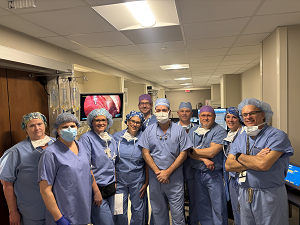Cancer Patient Support Group
This twice monthly group, facilitated by a professional counselor/social worker, offers patients an opportunity to express their feelings and...
Minimally invasive surgery and pioneering bladder-saving treatments.
If you have bladder cancer, you want a team of experts by your side. Our team includes surgeons who are among the most experienced in the country for robotic surgery, pioneering bladder-saving treatment options and specializing in nerve-sparing procedures to preserve urinary and sexual function.

Everyone on our team specializes in bladder cancer. We are dedicated to getting you the care you need. That’s why all our patients can expect:
We take a comprehensive approach to bladder cancer care, offering patients prompt diagnosis, follow-up consultations, access to the latest clinical trials for new treatments and therapies, and survivorship care.
 Our bladder cancer care team will create a personalized treatment plan based on your diagnosis, health needs, and concerns.
Our bladder cancer care team will create a personalized treatment plan based on your diagnosis, health needs, and concerns.
Your treatment options may include:
You may also be able to participate in clinical trials as part of your treatment plan. Clinical trials are research studies for new drugs, technology, and clinical approaches, including immunotherapy, to treat bladder cancer that are not widely available elsewhere.
Our team will be there for you throughout your treatment for medical and personal needs that may arise along the way. In addition to support from your nurse navigator, we offer a range of support services to help you during treatment, as well as a survivorship clinic to manage your post-treatment care.
This twice monthly group, facilitated by a professional counselor/social worker, offers patients an opportunity to express their feelings and...
If you or a loved one has been diagnosed with a Skull Base and Pituitary tumors or related conditions, we invite you to join our support and...
If you or a loved one has been diagnosed with a Skull Base and Pituitary tumors or related conditions, we invite you to join our support and...
Heal through art in the comfort of your home, but with the support of a group and registered art therapist during this monthly virtual art therapy...

DETROIT — Newly published research conducted in Wayne County, Mich. found that non-smokers, particularly women, who lived near textile and...




Millennials are now at a higher risk for developing colorectal cancer than baby boomers. Here are some potential reasons why - and what you can do to lower your risk.

For women undergoing breast cancer treatment, yoga and other low-impact exercises have proven benefits for reducing stress and aiding recovery.

Learn how to detect pancreatic cancer, who is at risk and what treatment advances have been made in recent years.

It's important to diagnose ovarian cancer as early as possible. Here's how to be proactive about your risk for this disease.
We use cookies to improve your website experience. By using this site, you agree to our Terms of Use. Read our Internet Privacy Statement to learn what information we collect and how we use it.